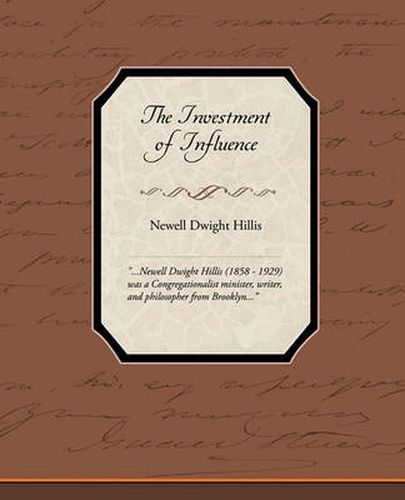Readings Newsletter
Become a Readings Member to make your shopping experience even easier.
Sign in or sign up for free!
You’re not far away from qualifying for FREE standard shipping within Australia
You’ve qualified for FREE standard shipping within Australia
The cart is loading…






This title is printed to order. This book may have been self-published. If so, we cannot guarantee the quality of the content. In the main most books will have gone through the editing process however some may not. We therefore suggest that you be aware of this before ordering this book. If in doubt check either the author or publisher’s details as we are unable to accept any returns unless they are faulty. Please contact us if you have any questions.
Newell Dwight Hillis (1858 - 1929) was a Congregationalist minister, writer, and philosopher from Brooklyn. As a minister in a major metropolis, Hillis railed against immorality, and he told reporters in 1900 that a common whipping post might be very wholesome for New York today. The Investment of Influence: A Study of Social Sympathy and Service was first published in 1897. The forward reads, The glory of our fathers was their emphasis of the principle of self-care and self-culture. Finding that he who first made the most of himself was best fitted to make something of others, the teachers of yesterday unceasingly plied men with motives of personal responsibility. Influenced by the former generation, our age has organized the principle of individualism into its home, its school, its market-place and forum. By reason of the increase in gold, books, travel and personal luxuries, some now feel that selfness is beginning to degenerate into selfishness. The time, therefore, seems to have fully come when the principle of self-care should receive its complement through the principle of care for others. These chapters assert the debt of wealth to poverty, the debt of wisdom to ignorance, the debt of strength to weakness. If A Man’s Value to Society affirms the duty of self-culture and character, these studies emphasize the law of social sympathy and social service.
$9.00 standard shipping within Australia
FREE standard shipping within Australia for orders over $100.00
Express & International shipping calculated at checkout
This title is printed to order. This book may have been self-published. If so, we cannot guarantee the quality of the content. In the main most books will have gone through the editing process however some may not. We therefore suggest that you be aware of this before ordering this book. If in doubt check either the author or publisher’s details as we are unable to accept any returns unless they are faulty. Please contact us if you have any questions.
Newell Dwight Hillis (1858 - 1929) was a Congregationalist minister, writer, and philosopher from Brooklyn. As a minister in a major metropolis, Hillis railed against immorality, and he told reporters in 1900 that a common whipping post might be very wholesome for New York today. The Investment of Influence: A Study of Social Sympathy and Service was first published in 1897. The forward reads, The glory of our fathers was their emphasis of the principle of self-care and self-culture. Finding that he who first made the most of himself was best fitted to make something of others, the teachers of yesterday unceasingly plied men with motives of personal responsibility. Influenced by the former generation, our age has organized the principle of individualism into its home, its school, its market-place and forum. By reason of the increase in gold, books, travel and personal luxuries, some now feel that selfness is beginning to degenerate into selfishness. The time, therefore, seems to have fully come when the principle of self-care should receive its complement through the principle of care for others. These chapters assert the debt of wealth to poverty, the debt of wisdom to ignorance, the debt of strength to weakness. If A Man’s Value to Society affirms the duty of self-culture and character, these studies emphasize the law of social sympathy and social service.